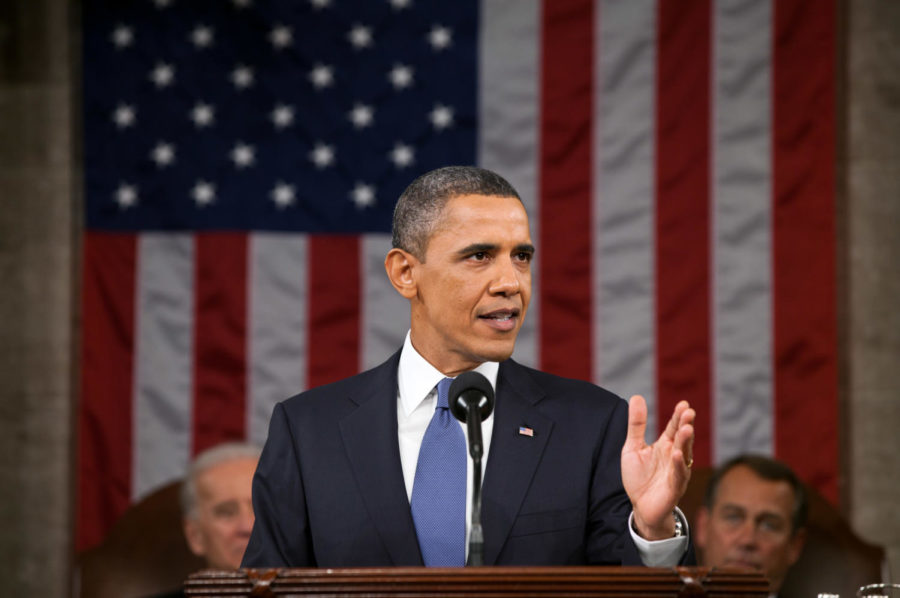- App Content
- App Content / News
- News
- News / Nation
- News / Politics And Administration
- News / Politics And Administration / City
- News / Politics And Administration / State
Obama’s health care law on life support
Obama at the 2011 State of the Union Address.
January 15, 2017
The presence of President Barack Obama’s health care law is one that has caused controversy since it was signed into law in 2010.
It all started in 2008 when Obama, while campaigning for president, made it clear to his supporters that he would be fighting for a universal health care system if he were to be elected into office.
Nearly 15 percent of all Americans were uninsured in 2008, with thousands dying each year due to not having access to or not having the money for the treatments needed to save their lives.
In one of his three debates against then-Republican presidential candidate, Sen. John McCain in 2008, Obama said that “… [health care] should be a right for every American.”
“In a country as wealthy as ours, for us to have people who are going bankrupt because they can’t pay their medical bills … there’s something fundamentally wrong about that,” Obama said.
Once elected, Obama sent both sides of Congress to work on health care.
It took nearly a year and a half for the Democratic-led Congress to work out a health care system that both sides could potentially support, though, the support for the eventual bill was not evenly split.
With a 60-39 vote in the Senate, the bill passed on Dec. 24, 2009.
On March 23, 2010, the bill was signed into law. The act took full effect on Jan. 1, 2014.
President-elect Donald Trump has spoken out avidly against the act, calling it an “incredible financial burden.”
The act extends insurance to more than 30 million uninsured Americans, builds upon Medicaid for those in need of financial assistance and provides subsidies for lower- and middle-class Americans looking to buy private coverage.
About 13 million Americans are currently enrolled in the act, according to obamacarefacts.com. But about 20 million individuals benefit from the act due to the Medicaid expansion and young adults being able to stay on their parents’ plans until they’re 26 years old.
The national uninsured rate reached an all-time low in 2016, with 8.6 percent of Americans reporting being uninsured.
When it comes to Iowa and the Affordable Care Act, the support was barely even from day one.
In the passing of the act in 2010, three out of Iowa’s five house representatives voted in favor of it.
The Senate vote was split for Iowa, with Democrat Tom Harkin voting in favor of the act and Republican Chuck Grassley voting against it.
The beginning of the 2016 election brought about a new round of debates for and against the act.
On his official website, Trump says that “On day one of the Trump Administration, we will ask Congress to immediately deliver a full repeal of Obamacare.”
Trump vows that through “free market principles and working together,” Congress and the Trump administration will “… broaden health care access, make health care more affordable and improve the quality of the care available to all Americans.”
The results of the 2016 election led Iowa to hold a strong Republican majority at the national level.
With two Republican senators, three out of four Republican house representatives and a Republican governor, the leaders of the state of Iowa back the president-elect’s stance on the act.
Iowa’s 4th District Rep. Steve King, R-Kiron, is particularly passionate about repealing the act.
On the first day of the 2017 Congress, King introduced a bill to repeal the act. No replacement plan is included in the bill.
Many Republicans in Congress, including two pro-choice members, have expressed caution in the immediate repeal of the act, instead wanting to wait until there is an official replacement plan in place.
In an interview with NPR on Jan. 12, King defended his bill, saying, “It’s my opinion that if we repealed Obamacare and did nothing [to replace it], we’re still far better off.”
King said that he believes that “… there is no constitutional … you have no right to a health insurance policy.”
Nearly 50,000 Iowans would lose their insurance if the act is repealed, according to the Journal Sentinel.
An additional 150,000 Iowans with pre-existing conditions would also lose their coverage if the Medicaid aspect of the act is eliminated.
After the results of the 2016 election, more than 12,000 Iowans signed up or renewed their insurance policies via the act.
“Many political leaders and insurance experts have advised consumers that 2017 insurance policies should be unaffected by calls to repeal the Affordable Care Act,” according to the Des Moines Register.
















